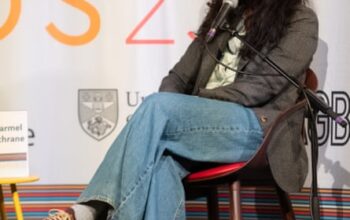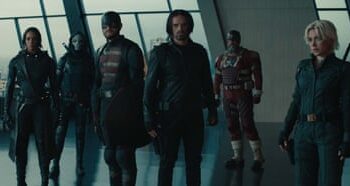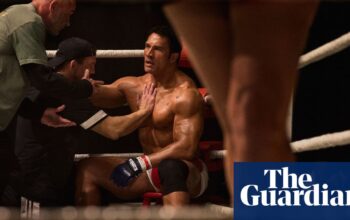Jennifer Connelly is on a Zoom call from her home in Brooklyn, jetlagged after attending Louis Vuitton’s pre-fall 2024 show in Shanghai, which does not bode well: she is known to have been reticent in past interviews, and sometimes while working. When she made A Beautiful Mind, the 2001 movie for which she won an Oscar for playing the wife of schizophrenic mathematician John Nash, the co-producer Brian Grazer was unnerved by her reserve. “It was hard for me to get to know her on the set because I’m so emotional,” he told a writer in 2001. “She’s very serious. She’s not silly. She doesn’t have that buoyancy.”
It is a relief, then, to find Connelly to be thoughtful and lovely and erudite, happy enough to discuss her life and career. I ask if Grazer’s description is one she’d recognise.
“I don’t think it’s that binary,” she says now. “For sure, especially when I was younger, I was pretty quiet on set, and I can be quite shy, which I think could translate as potentially something other than what it is.”
The shyness is understandable for an actor who got her start in showbiz as a kid. She once confessed to a journalist interviewing her for the New York Times that she tended to act “very bland” in interviews as a form of self-protection. She was a single mum at the time, so had plenty to protect. It can’t have been easy to maintain her privacy, particularly when so much media coverage was focused on her beauty. “This whole pursuit is something that I feel like I kind of slid into, and didn’t from the outset choose for myself, but that I found myself doing, and then sort of continued with,” she says.
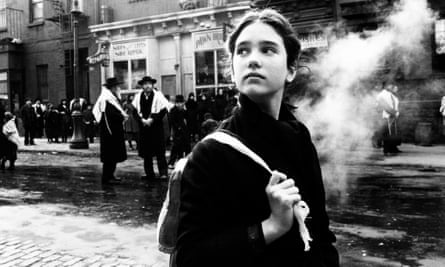
Born in the Catskill mountains in New York, Connelly became a model at the age of 10, and made her movie debut at 14 in Sergio Leone’s Once Upon a Time in America. On paper her teenage years – filming in Rome with Leone, co-starring with David Bowie in Labyrinth, and several cameos in Duran Duran videos – reads like a nostalgia trip on the BBC’s I Love the 80s, but somewhere in that whirl was a young woman who was still figuring herself out.
Not that she has regrets about the way life has played out. She has worked with various iconoclastic directors: Darren Aronofsky, Ang Lee, Todd Field and Dario Argento. Regrets would seem churlish. She has worked hard, and the effort has paid off. “This might sound trite but the truth is I feel so blessed with where I am,” she says. “And even the more uncomfortable chapters that might have been nice to have sidestepped or skipped over, are valuable in some way, and give me perspective to appreciate where I am now, and how things have turned out.”
Connelly leaves me to guess at the uncomfortable chapters, but she was devastated by the death of her father from cancer, in 2008, followed five years later by her mother. She has no siblings, making the loss all the more acute. “I had been very, very close to my dad, and it was really hard to lose him that suddenly,” she says. “He was living with us in Vermont when he died, and he had travelled a lot with us, and served as babysitter to our kids on various films. It was wonderful to have those experiences, but yeah – it was definitely an unresolved relationship for sure. He was quite young when he died.”
It’s telling that Connelly has not been tempted to live in LA, a city I imagine too slick for a woman so grounded. She says she prefers Brooklyn because she likes to be in a city where she can walk the streets and encounter people. “When I’m not working, we’re with our kids, we’re walking to school, going to soccer matches, spending time in the country,” she says. “I’ve always loved being in nature, and in the mountains in particular, and crave it more and more as I get older. If I don’t go outside, I get a little stir crazy. My kids and my husband joke that my favourite go-to line is, ‘Let’s go outside and move around a little.’” She and her husband, the British actor Paul Bettany, who she married in 2003 after meeting two years earlier on the set of A Beautiful Mind, have a second home in Vermont, where they spend time skiing and hiking and generally living what she calls “a pretty simple kind of quiet life.”
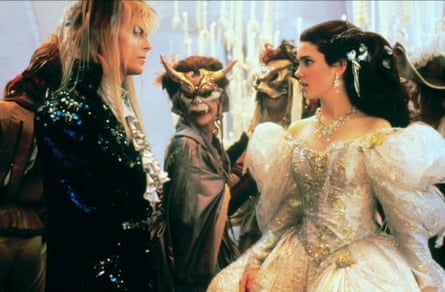
Brooklyn was also where Connelly spent much of her childhood, attending the private Saint Ann’s School in Brooklyn Heights, until her fledgling career began to take off. For a whole generation of late Gen X-ers, Connelly is best known for playing Sarah in the Goblin underworld of Jim Henson’s Labyrinth, a movie that has only grown in cult status since its release. As for Bowie, “his persona was so kind of elaborate and crafted and alien, but he just seemed kind of goofy,” recalls Connelly. “There’s something about how gracious he was, and how he was with me, which was so kind and gentle and comforting.” She describes Bowie sitting on the camera dolly cracking jokes with the crew and running lines with her. “I was really impressed by him, and how he behaved in that film. I’d been a fan of his, but became a super-fan after that.”
Connelly and I are meeting to talk about Dark Matter, a new Apple TV series based on Blake Crouch’s bestselling techno thriller. In it Connelly plays Daniela Dessen, the wife of physicist Jason Dessen, who is abducted by a version of himself from another dimension – it’s complicated – and wakes to find himself in a parallel world. Lots of parallel worlds in fact. In every one is another version of Daniela, another version of their son, Jason, and probably another version of you, too. Each Daniela is the same, but materially different. In one she is an art superstar; in another, she is a single mum with a husband in jail. Finding his way back to the original Daniela is the objective that impels Dessen, and the show, forward. As we are told in episode two: “The multiverse is infinite; there is no end.”
Early in episode two of Dark Matter the camera lingers on a TS Eliot quote at the entrance to an art gallery, a kind of thesis for the show: “Footfalls echo in the memory / Down the passage which we did not take / Towards the door we never opened / Into the rose-garden.” (The same passage is the epigraph to the book). Are there passages Connelly did not take in her life, doors she never opened? “Of course there are,” she says. “Of all the things that I go back and say, ‘Oh, I wish I had done that,’ I wish I’d finished college [she started an English course at Yale, then moved to Stanford before dropping out to pursue acting]. I’ve thought, in fits and starts, about going back.”
Occasionally she will find herself filling out an application form, only to abandon it, unsure what she wants to study. She is interested in American history, “and how it informs where we are now”, but she also flip-flops between science and medicine. “I guess I stopped studying so young that I hadn’t quite figured it out,” she says. “I was still at the point where I was interested in so many different things.”
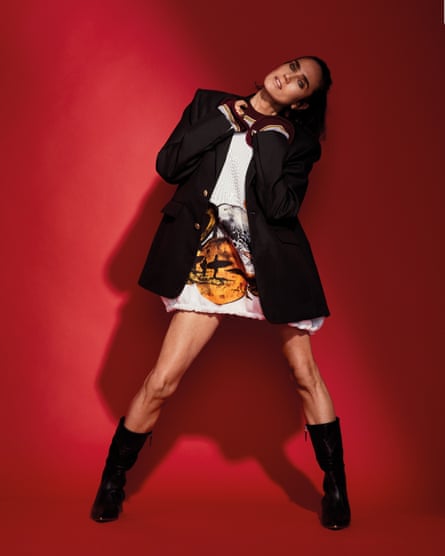
But she is also aware that being an actor satisfies some of the desire to experience the lives of others. “Doing what we do you get to peer into different worlds of these different characters, albeit in a kind of superficial, limited way,” she says. “I think that’s part of why I’ve never followed through with college applications that I’ve started.”
What keeps her up at night? She thinks for a moment, and says, “Oh gosh, sustainability. I just don’t know whether we can get out of our own way in time to turn things around and change the course of the world.” In 2006 she co-starred with Leonardo DiCaprio and Djimon Hounsou in Blood Diamond, a thriller set during the Sierra Leone civil war and an uncompromising indictment of the brutality of the diamond industry. Does she choose projects that complement her values? “I choose things that I’m interested in, but I can’t say I’m compiling a manifesto,” she says. “I don’t think it’s that deliberate.”
Rigorous about preparation, Connelly approaches her roles with the obsessive diligence of a school swot, dissecting her scripts until she is confident she can fully inhabit her characters. When Bettany directed her as a homeless junkie in his 2014 directorial debut, Shelter, he compared working with his wife to taking a gravel shower.
I ask, “Does that sound accurate?”
after newsletter promotion
Connelly laughs.
“Sure, yeah, definitely,” she says. “That’s a really accurate description of working with me, and I’ve inflicted it on so many people, not just my husband. I really do analyse things, I like to question everything, and I’m sure that’s frustrating sometimes. But I find it really helpful in clarifying. I don’t know if that makes things any better, but it’s the way I’ve come to do it for better or worse.”
Although Shelter was released to mixed reviews, Connelly says she’d love to work with Bettany again, despite the challenges they faced on a small budget. “I think it’s no secret between Paul and I that there was a lot that he had to focus on and worry about, so when I was coming up to him with my scroll of long questions that I wanted to discuss, he was, like, ‘Yeah, babe, whatever you want.’ I was, like, ‘What do you mean babe, whatever I want? Don’t you want to talk about it? I had gone into it with this expectation that we would have all this time to just sit together and dream up things we could do. And of course the realities of making a movie with those kinds of constraints meant that it wasn’t possible. Again, as it is with so many things in life, the only problem there was my expectation.”
Connelly is a brilliant, versatile actor, capable of rising above even the most underwritten role, deploying her emotional intelligence to give depth to the most outlandish plot. In her four-decade career, she has variously played a possessed ballerina (Etoile); a magazine editor in Pinochet’s Chile (Of Love and Shadows); a Gotham-ish bar singer (Dark City); Jackson Pollock’s lover, Ruth Kligman (Pollock); and, courtesy of Darren Aronofsky, both a heroin addict (Requiem for a Dream), and Naameh, the wife of Noah in the director’s Old Testament update. Directors uniformly love her. In 1998, Aronofsky had low expectations when Connelly auditioned for Requiem for a Dream. “I don’t think her career was thriving for some reason, but she gave one of the best auditions I’ve ever seen to this day,” he told New York magazine in 2020. “She came in, and I was not expecting anything, and she left with the role.”
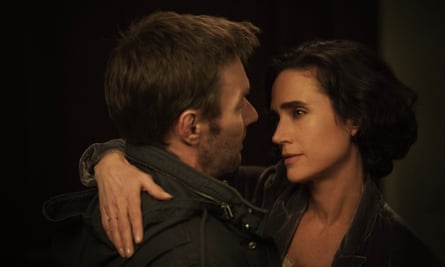
At the time, Connelly was still nursing her son, Kai, and would bring him with her on set. It was the most experimental film she had made. As preparation, Aronofsky would take her to watch drug addicts shooting up. It’s the part of her work she says she finds most interesting – “spending time with the story and thinking about who these people are and their psychologies and working in partnership with other people to create something.”
Just as she was reaching an age when Hollywood roles typically evaporate for women, TV came calling. She was 50 in 2020, when she was cast as the lead in TNT’s thriller, Snowpiercer. That show recently wrapped a fourth season, freeing her to step into the shoes of Daniela Dessen. Blake Crouch, the series showrunner and screenwriter, as well as the author of the book on which it is based, recalls seeing Connelly’s name on the list. “I was like, ‘Oh, man, that’ll never happen, but wow, if we could get Jennifer for Daniela, we will be on our way,” he says.
Because of its length, Dark Matter rewards Connelly’s nuanced performance by letting her character breathe and grow across its nine episodes. Although it unspools as a sci-fi with edge-of-your-seat twists and turns, Connelly is the moral compass around which the show’s existential questions revolve. “I know this is a show about the path not taken, but I was interested in a portrait of a marriage,” she says. “I wanted to show people navigating all these events that had taken place in their lives, the grief and the losses and the missed opportunities, and to show them on a journey to rediscover their commitment and partnership.”
Did her marriage to Bettany inform what she brought to her performance in Dark Matter?
She thinks about the question a moment. “I’m not trying to tell a story about myself or my marriage, but of course those are the most important relationships in my life – with my husband and with my children. That’s so much a part of who I am. Obviously it’s imaginative work being an actor, but the raw materials are our own emotions, which are forged by the experiences we have.”
Dark Matter premieres on Wednesday 8 May on Apple TV+
Source: theguardian.com
